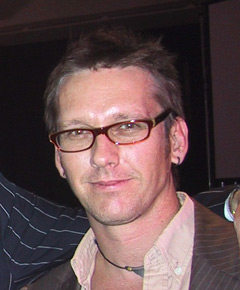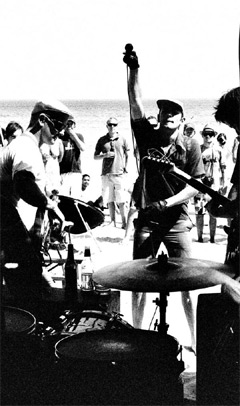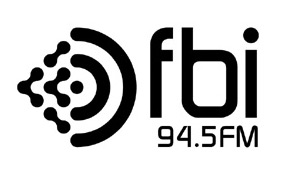Qweekend story: ‘The Grass Is Greener: Paul Piticco’, July 2014
A story for the July 19 issue of Qweekend magazine; a profile of Australian music entrepreneur Paul Piticco. The full story appears below.
The Grass Is Greener
Paul Piticco struck success while managing Powderfinger and now oversees an empire that stretches beyond music into events and hospitality
by Andrew McMillen / Portrait photograph by Russell Shakespeare
++
Five of the men who walk out onto Brisbane Riverstage on this warm Saturday night are well-known to the 10,000 fans in attendance, as together they have written some of Australia’s most popular songs. Between encores, though, another bloke in a grey suit with short black hair makes an appearance. Drummer Jon Coghill playfully wipes a towel across the stranger’s forehead. The band’s frontman approaches the microphone. “Ladies and gents, we have to introduce the virtual sixth member of Powderfinger: this is our manager,” says Bernard Fanning, gesturing to the man who is now copping a good-natured head-rub from guitarist Ian Haug. “He’s been our manager for the whole time. His name’s Paul Piticco. Put your hands together.”
The crowd obliges. After he gives a few quick bows to the hill and to each of the bandmembers, Piticco waves and jogs back to the side of stage, seemingly embarrassed at such public attention.
It’s 13 November, 2010, the night of Powderfinger’s final performance, a hometown send-off for the Brisbane quintet crowning a 34-date national tour that sold more than 300,000 tickets and grossed $30 million. After a final encore performance of ‘These Days’ and a group bow, Powderfinger ends its career on a high.
The band’s achievements are remarkable. Among them, more than 2.5 million albums sold in Australia alone, 18 ARIA awards, five consecutive ARIA No 1 album debuts, and twice topping Triple J’s annual Hottest 100 music poll. Behind their artistry was the business brain of Paul “Teaks” Piticco, a self-taught entrepreneur whose beginning as the wet-behind-the-ears manager of a little-known Brisbane rock band expanded into successful stakes in music festivals, touring and publicity, two independent record labels and a recent foray into the restaurant business.
As he tells it, Piticco’s achievements can be attributed to persistence, enthusiasm and a willingness to have a go. “That philosophy that you’re only as good as the last thing you do is something that I’ve always subscribed to,” he says. “That’s how you do great work: by being really interested, and by giving a shit about the outcome. I certainly don’t want to die wondering.”
It wasn’t always thus, according to Coghill, the last member to join Powderfinger, completing the quintet’s line-up in late 1991. In the 2011 band biography, Footprints, the drummer recalled his first impressions of the men with whom he’d spend the next two decades: “They were just these potheads who used to sit around the lounge smoking,” he said. “And Teaks was the ringleader … I remember that night [we met] he showed me this massive marijuana plant he had in the back yard. It was four metres high and two metres wide. I think before Teaks was the manager of the band, he was the manager of the lounge room and the bong.”
++
An only child born to Sernando and Carmel at the Royal Brisbane Women’s Hospital on March 7, 1969, Paul Anthony Piticco grew up in the inner-west Brisbane suburb of Paddington and attended Petrie Terrace State School. He loved school because it was his first chance to measure himself against others. “Maybe that was the germination of my competitive streak,” he says with a smile.
His father had emigrated to Australia from Italy at age 19, carrying only a suitcase and $10. He cut cane in North Queensland, bought a house in Brisbane and started a construction business. Piticco says Sernando advised his son to “figure your own shit out” and learn from his mistakes. Carmel – who worked part-time jobs in nursing and education – encouraged Paul to spring out of bed in the morning, follow his dreams and do what makes him smile.
His parents’ record collection was “diabolical”, so it wasn’t until he started at Kelvin Grove State High in Brisbane’s inner north-west that Piticco’s musical horizons expanded. When KISS played at Lang Park (now Suncorp Stadium) in 1980, he snuck down Ranley Grove onto Given Terrace and watched them through the fence. It was the first time Piticco made a connection between hearing a song on the radio and tens of thousands of fans going to see a band play live in a stadium. He was enthralled, and started buying cassettes and vinyl – David Bowie, Led Zeppelin, Dire Straits – while learning guitar and saxophone, both of which he failed to practise. At 15, he’d take a square of cardboard to Queen Street Mall and attempt to breakdance while dressed in baggy pants. This phase soon passed – as Piticco puts it, “The world moved on, and I moved with it.”
It was during his first job, as a paperboy selling the Telegraph, that Piticco established his work ethic. He determined how to achieve the maximum return with the smallest effort by catching customers at the former Arnott’s biscuit factory on Coronation Drive when shifts were crossing over. A regular clientele earned the ten-year-old hefty tips for his value-adding personal touches, such as handing over the paper with the sports page or the horoscopes facing up, ready to read.
In his mid-teens, Piticco worked weekend nights at the 24-hour Windmill Cafe on Petrie Terrace, where he learned how to be patient with intoxicated people, which he notes has “come in handy working in bars, venues and festivals in the years to come”. He completed Year 10 at Kelvin Grove High but dropped out part way into the following year. “My passion for study declined rapidly,” he says, after he discovered smoking and drinking.
In his late teens, Piticco tried working part-time for his father and uncle’s construction business. It didn’t take. “I didn’t want to work a manual job, grinding it out in the sun like my dad. I knew that I wanted something different; I just didn’t know what it was yet.” It was around this time that he discovered cannabis. “There was a fair degree of overlap between my pot-smoking days and my lost years,” he says. “It just heightened all my senses in terms of listening to music and having a good time. In a stereotypical way, it was a countercultural way to rebel as a late teen.”
At the time, Piticco worked as a steel sales representative for Boral and lived in a share house in the western suburb of Indooroopilly. One night, he and housemate Ian Haug went for a drive, and the guitarist asked his friend whether he’d be interested in managing Powderfinger as Haug had grown tired of juggling his band’s business interests and writing music.
“He knew nothing about the music industry; we gave him an opportunity because we could see something in him,” says Haug. “We needed a ‘bad cop’, and he was a good bad cop. We didn’t want to be the ones ringing up bikers saying ‘pay us our money’. He had to be the tough guy. And Piticco’s a pretty tough name.”
Bassist John Collins saw it another way: “We thought, if he could sell steel, he could sell rock.” With the assistance of a lawyer, the band drew up a management contract which determined that everything outside of the actual music-making would be split six ways. “After that contract lapsed, we worked with him without a contract for most of our career,” says Haug. “Probably in retrospect it wasn’t a wise business decision for the band, but he did a good job for us.”
It took years before the band started seeing any real money for their efforts. “As a manager, you’re only ever as good as your band,” Piticco says. “Your fates are hitched in a fiscal sense.” As Powderfinger’s star ascended, the six men named on the contract came into good money following years of low-income toil. “Money was always much more important to Paul than the rest of us,” says singer Bernard Fanning. “We were always surprised by the fact that we actually earned a living and made money out of being musicians. Paul has always liked the idea of money, and the potential of it, rather than the actual act of splashing out and buying a fancy bottle of champagne.”
Haug suggests Piticco didn’t change much throughout the band’s two-decade career. “He’s just loaded now, whereas he used to be flat broke,” he laughs. The entrepreneur reinvested his earnings into the industry, forming an artist management company, Secret Service. His independent record label, Dew Process, was established in 2002 and has released popular albums by international acts such as Mumford & Sons, The Hives and London Grammar as well as Australian artists The Living End, Sarah Blasko and, of course, Bernard Fanning. Album sales still account for the majority of the label’s income. In 2012, Piticco established another record label, Create/Control, which in effect turns the old business model on its head by partnering with acts to distribute and market music they’ve funded and recorded themselves.
In conjunction with Powderfinger’s longtime booking agent, Jessica Ducrou, he established Splendour In The Grass, an annual multi-day music festival – being staged at North Byron Parklands next weekend – sidestepping the competitive summer circuit. All 27,500 tickets to this year’s event, headlined by Outkast, Lily Allen and Two Door Cinema Club, were sold within hours of going on sale. “Paul and I have done all sorts of glamorous jobs – directing traffic, picking up garbage,” says Ducrou, 44. “He’s really positive, he mucks in. He has no airs and graces. He’ll do whatever is required.” The pair’s Secret Sounds touring company has also invested in The Falls Festival, traditionally a southern (Tasmania and Victoria) camping event which debuted in Byron Bay in late 2013.
Critics point out that a handful of Piticco’s acts inevitably appear on Splendour’s bill each year, a tradition that stretches back to the first event in 2001, headlined by Powderfinger. “Why wouldn’t you book yourself?” asks Patience Hodgson, singer of Piticco-managed Brisbane pop band The Grates. “Paul doesn’t take any commission when we play Splendour, and that’s to lower his invested interest.”
If such criticisms are laid at Piticco’s feet, so be it. He’s happy to wear the tar and feathers if it means his artists stay squeaky clean. “If people hate him, but love the band, he totally understands that’s fine,” says Hodgson. “He’s not trying to protect himself; the band always comes first. If he’s offered a gig and thinks we should be paid more money, he asks. I really appreciate that, because I could never do that for myself; I wouldn’t want to seem like a dick or be rude. Paul is happy to ask, and if people say no, he doesn’t feel shame.”
++
Piticco has one favourite album – DeadSexy by little-known Rhode Island (US) alternative rock band Scarce – and two favourite songs: ‘Heroes’ by David Bowie and ‘The Funeral’ by Seattle rock act Band of Horses, who he has booked to play Splendour twice. His favourite Powderfinger album is 1998’s Internationalist. When asked to name a favourite song, he deliberates for two minutes. “The one that makes me feel and think most positively about the band is ‘Sunsets’,” he replies, referring to a single from 2003’s Vulture Street album. “Amongst all those anthems that they wrote, that one, to me, sounds and feels like Australian music at that time. It definitely pulls at my heartstrings.”
At 45, Piticco is showing no signs of slowing down. In 2014, he seems to have his fingers in more pies than ever before. “There’s a good balance between Paul being a serious, effective entrepreneur and knowing how to switch off and have fun, and not take things too seriously,” says Ducrou. For his 40th birthday, Piticco booked an AC/DC tribute band to play at the property near Mount Warning in northern NSW where he lives with his partner of 15 years, Lisa Wickbold, and their children Phoebe, 7, Ivy, 5, and Darby, 3.
It takes considerable drive and intensity to create record labels, music festivals, national tours and artistic careers out of thin air, especially when based outside of the traditional Australian music business seats of power in Sydney and Melbourne. For Piticco and Powderfinger, moving south never appealed. “We were regularly encouraged to leave by labels, agents, promoters and other bands; ‘Come down here, it’ll be better, there are more opportunities!’” he says. “Brisbane had value to us. It wasn’t just more affordable, it provided a framework and an emotional base. Our social networks were here. It’s something we’ve always been proud of, this city. There was never any doubt. I’m glad we stayed.”
The sun sets over the Brisbane skyline on a recent cool evening as we sit at a table in South Bank restaurant Popolo, which Piticco co-founded in late 2011 with restaurateur Andrew Baturo and Denis Sheahan, Powderfinger’s former tour manager. Its name is Italian for people, in reference to the menu’s inclination towards shared dishes. While we talk, plates are laid out in quick succession. It’s far too much food for two men; Piticco jokes that his children will have some interesting leftovers for tomorrow’s lunch.
In addition to Popolo, Piticco co-owns a stake in CBD venue The Gresham Bar, which opened late last year. This left turn into the hospitality industry has been on the cards for years. “The chef is the artist, the restaurateur is the producer,” Piticco says. “The chef serves up his works; the producer critiques them, works out which ones are going to be the hits, which ones will pad out the menu. Instead of listening, you taste. The ambience is the marketing and packaging – the visual representation – but the real thing that makes a successful restaurant is the food. It’s just as it is in the music industry: a lot of bad bands have an image, but the songs are really the meat of the proposition.”
Observing the detritus of a fine meal, Piticco sums up his life so far in simple terms. “I’ve always had this theory that stems from my mum,” he says. “Whether you’re a chimney sweep, a brain surgeon or a band manager, if you’re good at what you do, the rest takes care of itself. I just like having the opportunity to make a living out of music, for myself and others, and along the way make a whole bunch of people happy by enriching their lives in some way. And to get paid for it? That’s fucking awesome!”
Splendour In The Grass, July 25-27, North Byron Parklands, Byron Bay. splendourinthegrass.com

 This is my first interview on behalf of
This is my first interview on behalf of 


 I’m not sure if it’s the industry that’s pushing artists to releasing albums, or whether it’s more the artists holding on to the idea. Certainly, if you take
I’m not sure if it’s the industry that’s pushing artists to releasing albums, or whether it’s more the artists holding on to the idea. Certainly, if you take 